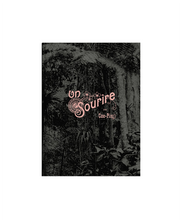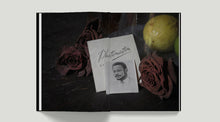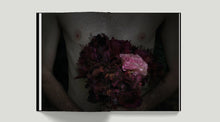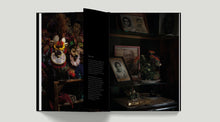
MARIE MONS
A PILOT CASE SMILE
Published by Editions de Juillet, 2023
Book size 18.5 x 24.5 cm
Pages 96
Hardcover
Language French, English
Like a return to the source of identity, Un smile de Case-Pilote is rooted in Martinique, the native island of Marie Mons' grandfather, a character with a complex personal and family history whom the author has rarely met. This quest comes at a time when she is experiencing motherhood. Starting from an individual story, that of her family, she encountered Creole culture. Her identity has been marked by the traumatic foundations of colonial society, but also reunited by métissage, claimed in the West Indies as a cultural identity.
Between artistic research and intimate questioning, Marie Mons offers a free and constructed photography. With sensitivity and rigor, her geographical and personal landscapes resonate throughout her work.
Patrick Chamoiseau, who wrote the afterword, is a French writer from Martinique. Author of novels, short stories and essays, and a theorist of creolité, he has also written for theater and film. He was awarded the Prix Goncourt in 1992 for his novel Texaco.
This work received the label and support of the Foundation for the Memory of Slavery.
Text by Marie Mons
...
Like a return to the source of identity, Un sourire de Case-Pilote takes root in Martinique, the native island of Marie Mons' grandfather, a character with a complex personal and family history that the author has not encountered only rarely. This quest occurs at the time when she experiences motherhood. Starting from an individual story, that of her family, she encountered Creole culture. Her identity was marked by the traumatic foundations of the colonial society, but also united by crossbreeding, claimed in the Antilles as a cultural identity.
Between visual research and questioning of the intimate, Marie Mons offers a free and constructed photography. With sensitivity and rigor, her geographical and personal landscapes resonate throughout her work.
Patrick Chamoiseau, who wrote the afterword, is a French writer originally from Martinique. Author of novels, short stories, essays, theoretician of creole identity, he has also written for the theater and cinema. He was awarded the Prix Goncourt in 1992 for his novel Texaco.
This work has received the label and benefited from the support of the Foundation for the Memory of Slavery.
Text by Marie Mons
A PILOT CASE SMILE
Published by Editions de Juillet, 2023
Book size 18.5 x 24.5 cm
Pages 96
Hardcover
Language French, English
Like a return to the source of identity, Un smile de Case-Pilote is rooted in Martinique, the native island of Marie Mons' grandfather, a character with a complex personal and family history whom the author has rarely met. This quest comes at a time when she is experiencing motherhood. Starting from an individual story, that of her family, she encountered Creole culture. Her identity has been marked by the traumatic foundations of colonial society, but also reunited by métissage, claimed in the West Indies as a cultural identity.
Between artistic research and intimate questioning, Marie Mons offers a free and constructed photography. With sensitivity and rigor, her geographical and personal landscapes resonate throughout her work.
Patrick Chamoiseau, who wrote the afterword, is a French writer from Martinique. Author of novels, short stories and essays, and a theorist of creolité, he has also written for theater and film. He was awarded the Prix Goncourt in 1992 for his novel Texaco.
This work received the label and support of the Foundation for the Memory of Slavery.
Text by Marie Mons
...
Like a return to the source of identity, Un sourire de Case-Pilote takes root in Martinique, the native island of Marie Mons' grandfather, a character with a complex personal and family history that the author has not encountered only rarely. This quest occurs at the time when she experiences motherhood. Starting from an individual story, that of her family, she encountered Creole culture. Her identity was marked by the traumatic foundations of the colonial society, but also united by crossbreeding, claimed in the Antilles as a cultural identity.
Between visual research and questioning of the intimate, Marie Mons offers a free and constructed photography. With sensitivity and rigor, her geographical and personal landscapes resonate throughout her work.
Patrick Chamoiseau, who wrote the afterword, is a French writer originally from Martinique. Author of novels, short stories, essays, theoretician of creole identity, he has also written for the theater and cinema. He was awarded the Prix Goncourt in 1992 for his novel Texaco.
This work has received the label and benefited from the support of the Foundation for the Memory of Slavery.
Text by Marie Mons













